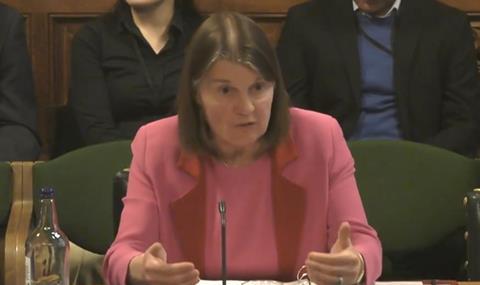Rachael Maclean promises ‘detailed rebuttal’ of Lichfields analysis predicting 77,000-home drop in housing output
The Department for Levelling Up, Housing and Communities is to publish a “detailed rebuttal” of high-profile research by Lichfields that suggested that housebuilding will fall sharply in response to government planning reforms, the housing minister has said.
Rachael Maclean told the levelling up, housing and communities select committee that the government “didn’t accept the premise” of the Lichfields report, which predicted 77,000 fewer homes would be built per year if the national policy reforms consulted on before Christmas were brought into force.

Maclean denied the proposals, which would effectively water down the application of local housing targets by allowing councils a series of carve outs, would result in a reduction in the delivery of housing, despite the widespread fears voiced by developers. She said the government was actually forming policy “starting from the basic principle that every change we make must deliver more houses”.
Emran Mian, director general of regeneration at the Department for Levelling Up, Housing and Communities (DLUHC), speaking alongside Maclean, added that the government’s planned changes would see more homes delivered by reducing local resistance to getting local plans adopted, with adopted local plans tending to result in more homes being built.
MPs on the levelling up committee asked Maclean whether the government’s plans to build 300,000 homes per year now had a “gargantuan Titanic iceberg sized hole in it because the targets within local plans were now only advisory.”
Maclean rejected the question, and said: “We’re very clear that we want to see those numbers of houses built […] and the way that we will achieve that is by having local plans and making it quicker, easier, simpler, clearer for local authorities to get the local plans in place.”
The Lichfields report, commissioned by the Home Builders Federation and the Land Promoters and Developers Federation, concluded that the proposals to remove the requirement for greenbelt reviews and the removal of the five-year housing land supply test on councils with in-date plans would make up the bulk of a 77,000-home per annum reduction in the number of homes built each year.
Maclean said: “We don’t necessarily accept the premise and the analysis that Lichfields has used to come up with those numbers, because frankly they don’t know. They’re projecting something into the future that doesn’t exist yet.
“So, we are working through some of the very granular details and trying to dig into some of their analysis, so that we can come up with a detailed rebuttal of that, to give people confidence. Obviously we respect their research, they’re a well respected body, but we don’t necessarily agree with it, because they’re making assumptions.”
“We’re keen to get that response into the public domain to alleviate some of those concerns.”
Maclean said the government’s proposed changes were being brought in because top down housing targets had been a “failure”, however she accepted that if housing plans dropped off as predicted by Lichfields, then government would have to step in. “Clearly the government would have to do something”.
She added that housing targets had been changed to being advisory to reflect the “will of parliament”, but also pointed out the system wasn’t building enough homes currently. “We’re starting from the basic principle that every change we make must deliver more houses.
“You’re right to ask what happens if the system isn’t delivering enough homes three years from now. We would have to take a good long look, and tailor a response to whatever the factor was.”
Maclean’s responses came amid growing concern over the state of local authority planning, with more than 20 councils estimated to have paused work on local plans since the announcement of the consultation into the National Planning Policy Framework (NPPF), one of nine planning system consultations currently ongoing.
Mian said the figure of 25 local authorities having paused plans provided by the committee was “probably an over estimate” and that “we have seen lots of evidence of local planning authorities continuing to take measures to complete plans that were in preparation”. He said: “What we were increasingly picking up [was] that the thing that was blocking progress on making a plan was [that] the plan would have necessitated development that – there were strong local views – was out of character, wholly out of character, with the development that already existed.
“If we’ve got that balance right […] then that ought to help to get more plans through the system.”
Maclean said the consultation had prompted over 26,000 responses, which the department was currently reviewing.
Matthew Spry, author of the Lichfields research, said in response to Maclean’s comments that he stood by his firm’s “straightforward” analysis and awaited a new analysis by the government “with interest”. He said: “The Government’s task is to demonstrate why it believes the proposed NPPF reforms will maintain or increase housing supply in the face of a consensus across the sector – including from many who support the reforms – that it will do the opposite.”
He said the ability for areas to opt out of Green Belt reviews and be more able to cite constraints, the dilution of the duty to cooperate, and the reduced obligation to maintain a deliverable land supply would all have downside effects on housing supply.
>> See also: Warning of ’complete collapse in local plan-making after Gove reform announcement
>> See also: Steve Morgan interview: its like the government wants to destroy the industry
>> See also: Inside the council planning department resource crisis
He added that the idea the reforms would boost supply by increasing local plan production was based on a logical fallacy. He said: “Blueprints produced over the past ten years were underpinned by the very provisions in the NPPF - Green Belt reviews, higher densities in urban areas, an obligation to address unmet need in neighbouring areas, maintaining a deliverable supply of land - that the current proposed reforms would now remove.
“When it comes to boosting housing supply, past local plans are unlikely to be a reliable guide to the performance of future ones.”
Paul Brocklehurst, chair of the LPDF, which commissioned the research, said: “We look forward to the publication of the Government’s own assessment of the impact on housing delivery of its proposed changes to the NPPF as promised by the Minister in her evidence to the Commons Select Committee.
“However, at the moment 55 LPAs have paused, suspended or withdrawn their Local Plan processes, data from the ONS highlights the dramatic drop in construction activity within the housing sector and recent stats on planning applications and consents are all heading in a downward direction. Accordingly, we look forward to working with the Government in relation to its proposals to ensure that this country builds the homes, and in particular affordable homes, that this country so desperately needs.”
A spokesperson for the Home Builders Federation said: “The study of the Government’s reforms by Lichfields was considered and robust, and gives a balanced analysis of the risk posed by the Government’s capitulation to its anti-development backbenchers.
“All independent assessments of the changes being made to the planning system, including the removal of sanctions on councils that fail to meet housing need, confirm that the impact will be a dramatic fall in housing supply which brings with it consequences for jobs and growth. While we look forward to the Government’s rebuttal of Lichfields’ analysis, we would much rather the Housing Secretary used the time to meet with small and medium-sized house builders to understand the impact the reforms will have on their businesses.”
The comments follow fresh criticism of the government’s housing policies from the chief executives of housebuilding giants Taylor Wimpey and Vistry.
A Fair Deal for Housing campaign

Housing Today believes the government should not back away from its manifesto pledge of building 300,000 new homes a year by the middle of the decade. We badly need more homes and a lack of supply is a major factor in creating problems of affordability for both buyers and renters.
Over the next few months, Housing Today will be exploring potential solutions to help us ramp up housebuilding to 300,000. These are likely to, include different ways of working, funding asks of government and policy ideas that could boost housebuilding.
We want to hear from you: what do you think can make a difference at a policy level?
What can the industry do better?
We believe that, with the right commitments from ministers and the industry, it is possible to build more homes and help the government to meet its objectives to “build beautiful”, improve quality and safety, boost home ownership and level up the UK.
Click here to find out more about the campaign
To contribute ideas to our A Fair Deal for Housing Ideas Zone database, click here.
A Fair Deal for Housing is part of the Building the Future Commission











No comments yet